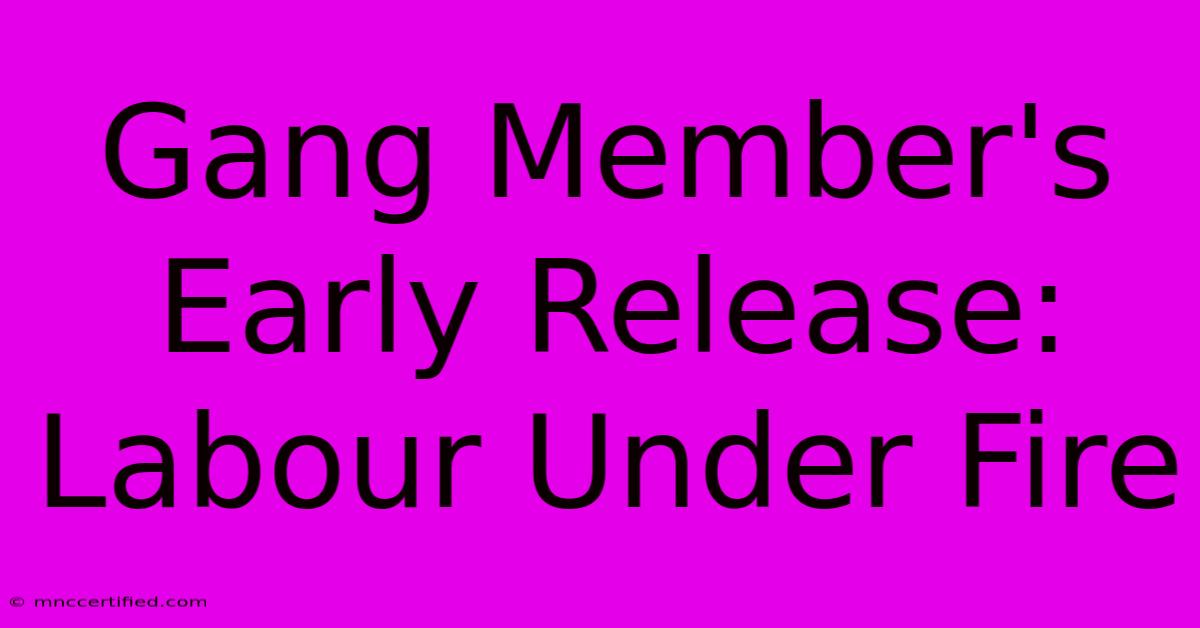Gang Member's Early Release: Labour Under Fire

Table of Contents
Gang Member's Early Release: Labour Under Fire
The early release of a convicted gang member has ignited a fierce political firestorm, placing the Labour government under intense pressure. The controversy highlights deep-seated public anxieties surrounding crime, punishment, and the effectiveness of the justice system. This article delves into the specifics of the case, examines the public reaction, and analyzes the political fallout for the Labour party.
The Case of [Gang Member's Name]
The release of [Gang Member's Name], a member of the [Gang Name] gang convicted of [Crime Committed], has sparked widespread outrage. [He/She] served [Number] years of a [Number] year sentence, benefiting from a controversial early release program designed to alleviate prison overcrowding and promote rehabilitation. The specifics of the program, including the criteria for early release and the level of supervision afforded to released inmates, are now under intense scrutiny. Key details include:
- The Nature of the Crime: The severity of the original crime is a crucial element of the public's anger. The fact that [Gang Member's Name] was convicted of [Crime Committed], a crime viewed by many as particularly heinous, contributes significantly to the outrage.
- The Early Release Program: The specifics of the early release program itself – its goals, its methodology, and its oversight – are being dissected by the media and opposition parties. Questions are being raised about whether the program adequately assesses the risk of re-offending and whether sufficient resources are dedicated to post-release supervision.
- Public Safety Concerns: The most significant concern raised by critics is the potential threat to public safety posed by [Gang Member's Name]'s release. The lack of transparency surrounding the decision-making process further fuels these concerns.
Public Outrage and Media Frenzy
The news of [Gang Member's Name]'s early release has dominated news headlines and social media feeds. Public reaction has been overwhelmingly negative, with many expressing feelings of anger, betrayal, and fear. This intense public reaction underscores a broader societal concern about:
- Rising Crime Rates: Concerns about rising crime rates, particularly violent crime, have created a fertile ground for public anger towards the government's handling of the justice system. The early release is perceived by many as a sign of leniency that undermines efforts to maintain public safety.
- Lack of Transparency: The perceived lack of transparency surrounding the decision to grant early release has fueled distrust in the government and the justice system. Many are demanding greater accountability and clearer communication regarding such decisions.
- Effectiveness of Rehabilitation Programs: The incident has sparked a debate about the effectiveness of rehabilitation programs within the prison system. Critics question whether such programs are adequately preparing inmates for reintegration into society and preventing recidivism.
Political Fallout for Labour
The controversy has placed immense pressure on the Labour government. Opposition parties have seized the opportunity to criticize the government's handling of crime and justice, accusing them of being soft on crime and prioritizing prison decongestion over public safety. The political fallout includes:
- Erosion of Public Trust: The incident risks eroding public trust in the Labour government's ability to effectively manage crime and maintain public safety.
- Damage to Reputation: The negative publicity surrounding the case is damaging the Labour party's reputation and could impact its standing in upcoming elections.
- Calls for Policy Review: The controversy is likely to result in calls for a thorough review of the early release program and potentially broader reforms to the criminal justice system.
Conclusion: A National Conversation
The early release of [Gang Member's Name] has triggered a much-needed national conversation about crime, punishment, and the balance between rehabilitation and public safety. The Labour government faces a significant challenge in responding to public concerns and restoring confidence in its handling of the justice system. The outcome of this controversy will likely shape future policy decisions and influence public perceptions of the government's approach to crime for years to come. Further investigation and transparent communication are crucial to addressing the concerns raised and preventing similar incidents in the future.

Thank you for visiting our website wich cover about Gang Member's Early Release: Labour Under Fire. We hope the information provided has been useful to you. Feel free to contact us if you have any questions or need further assistance. See you next time and dont miss to bookmark.
Featured Posts
-
Getting To Know Callum Turner Dua Lipas Boyfriend
Dec 28, 2024
-
Cee Dee Lamb Out Mc Carthy On Cowboys Injury
Dec 28, 2024
-
Starmers Brother Dies On Boxing Day
Dec 28, 2024
-
Hook Movie Star Wars Easter Eggs And Appearances
Dec 28, 2024
-
Hershey 2025 Family Vacation Guide
Dec 28, 2024